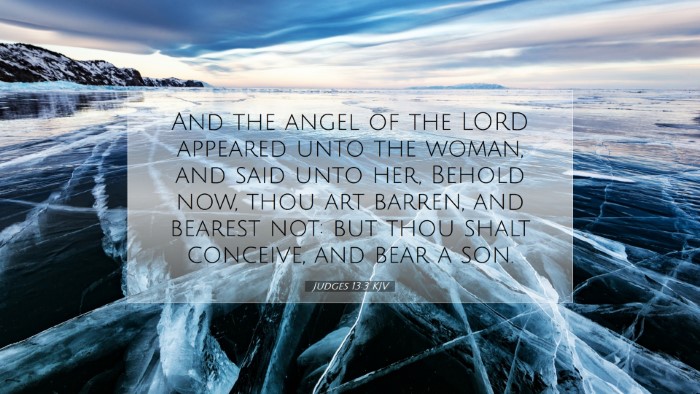Commentary on Judges 13:3
This verse marks a pivotal moment in the narrative of the Book of Judges, encapsulating the beginning of the story of Samson, one of Israel's most notable judges. Judges 13:3 states,
“And the angel of the Lord appeared unto the woman, and said unto her, Behold, now, thou art barren, and bearest not: but thou shalt conceive, and bear a son.” This announcement heralds a significant miraculous event that underlines the divine intervention in Israel's history.
Context and Overview
The Book of Judges chronicles a tumultuous period in Israel's history, characterized by cycles of sin, oppression, repentance, and deliverance. The Israelites found themselves in spiritual and moral decay, suffering under the oppression of their enemies due to their idolatry. In this bleak context, God raises judges to deliver the people, showcasing His mercy despite their failures.
Analysis of the Verse
1. Divine Intervention
The appearance of the angel of the Lord signifies God’s direct involvement in human affairs. According to Matthew Henry, this angel represents a pre-incarnate appearance of Christ, who often intervenes at critical junctures in God's redemptive history.
2. The State of Barrenness
In biblical times, barrenness was viewed as a source of shame and despair for women. The mention of the woman's barrenness is not just a statement of fact but a setup for the miraculous. Albert Barnes highlights the significance of this contrast: God's promise of a son to a barren woman serves to magnify His power and sovereignty. It indicates that divine blessings often come through unexpected means.
3. A Promise of Future Hope
The promise of conception and childbirth is loaded with theological significance. Adam Clarke notes that this is a motif throughout Scripture, where the barren are often chosen for divine blessings, such as Hannah and Sarah. It serves as a reminder of God's faithfulness to His people and His ability to bring life from death—both physically and spiritually.
Theological Implications
1. The God Who Sees
The message delivered by the angel implies that God sees the plight of His people. Matthew Henry underscores that God’s attention to an individual’s suffering reflects His compassionate nature. The promise made to Manoah's wife reassures the believer that God is aware of their struggles.
2. Divine Calling
Samson is to be consecrated as a Nazirite from birth, destined for the deliverance of Israel. This is significant as it illustrates the concept of divine calling. Albert Barnes emphasizes that God's purposes are often established before birth, indicating that individuals have a predetermined role within God's plan.
3. The Role of Women in God's Plan
The narrative centers on a woman who, despite societal stigma due to her barrenness, is chosen to bear a child who will deliver Israel. Adam Clarke remarks that this underscores the importance of women in redemptive history. It serves to elevate the status of women as instruments of God’s purpose.
Application for Today's Believers
1. Hope in Despair
For congregants facing bleak situations, this passage offers hope. The miraculous birth of Samson becomes a symbol of hope for those in despair, reinforcing the belief that God can intersect human limitation with divine possibility.
2. Recognition of God's Call
The passage invites believers to consider the unique roles God has assigned to each of them. Each believer may find reassurance in the understanding that they have been called for a purpose within God's grand design.
3. Acknowledging Women's Vital Role
This account championing a woman's pivotal role serves as a reminder of the essential contributions women make within the church and society. It calls for a recognition of God's transformative purposes that often involve the most overlooked among us.
Conclusion
Judges 13:3 not only heralds the birth of a significant figure in Israel's history but also encapsulates profound theological truths about God's nature, His sovereign plans, and the importance of individuals in fulfilling these plans. As believed by Matthew Henry, Albert Barnes, and Adam Clarke, this verse carries weight in its implications for understanding hope, divine purpose, and the essential role of women in God's unfolding story.


